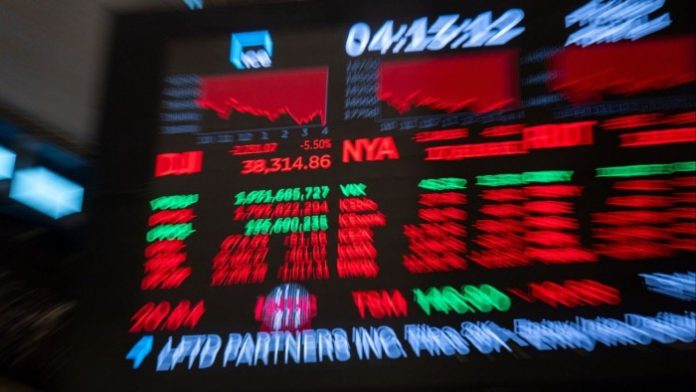Stay informed with free updates
Simply sign up to the US equities myFT Digest — delivered directly to your inbox.
US stock-index futures dropped sharply on Sunday after the Trump administration indicated that sweeping tariffs would be kept in place despite fears they could induce a global economic recession.
Contracts tracking the blue-chip S&P 500 fell 3.8 per cent and those for the tech-heavy Nasdaq 100 slid 4.6 per cent. Trading activity is typically light early in the Asian morning, which can exacerbate volatility.
The declines come after more than $5tn was erased from the S&P 500 on Thursday and Friday at the end of its worst week since the onset of the pandemic in 2020. Donald Trump’s move to upend the global trade order by implementing huge levies on US imports has deepened concerns about the trajectory of the world’s economy. China announced retaliatory duties on Friday of 34 per cent.
Commodities also sustained heavy losses in early trading Sunday night, with West Texas Intermediate, the US benchmark, falling 3.4 per cent to $59.90 a barrel — below the price needed by most shale producers to break even. International marker Brent dropped 3.1 per cent to $63.53.
Copper, widely seen as a proxy for the global economy because of its industrial uses, fell more than 5 per cent to $4.14 a pound in US trading.
Over the weekend, Trump’s Treasury secretary Scott Bessent dismissed the “short-term” market reaction to the president’s aggressive tariffs, telling NBC that the White House will “hold the course”.
“Our trading partners have taken advantage of us,” Bessent said on Sunday. Asked whether Trump’s tariffs were negotiable, he said: “We’re going to have to see what [other] countries offer and whether it’s believable”.
His comments followed a warning from Federal Reserve chair Jay Powell that the tariffs would stoke “higher inflation and slower growth”.
JPMorgan economists said on Friday they expected the world’s biggest economy to contract 0.3 per cent this year “under the weight of tariffs”. They had previously forecast US growth of 1.3 per cent.
Some investors worry stocks will continue to slide until Trump indicates that his tariffs will be less aggressive.
Activist investor Bill Ackman, who vocally backed Trump during the election campaign, posted on X that “massive and disproportionate tariffs” risked “destroying confidence in our country as a trading partner, as a place to do business, and as a market to invest capital.”
He urged Trump to call “time out” on Monday.
“Alternatively, we are heading for a self-induced, economic nuclear winter, and we should start hunkering down,” he wrote.
Dec Mullarkey, managing director at SLC Management, said: “Uncertainty is the big word right now and we’re not even at peak policy uncertainty yet.”
Banks and technology stocks were among those hardest hit last week as the dollar sank against other major currencies, and Treasury yields, which move inversely to prices, tumbled as investors rushed into perceived safe haven assets. European and Asian equities markets also fell sharply, while commodities including copper and oil dropped on fears of a global trade war.
Friday marked the fifth largest session of “active net reductions” by investors since 2010, according to Morgan Stanley, with equity long-short funds responsible for 80 per cent of the net selling.
The S&P 500’s more than 10 per cent decline over Thursday and Friday is only the fourth time in the past 85 years — after the 1987 crash, in 2008 during the financial crisis and in early 2020 — that the index has fallen so far, so fast, according to Deutsche Bank.






